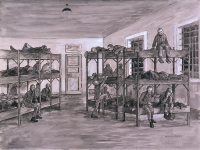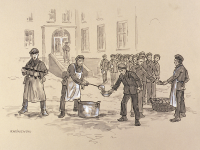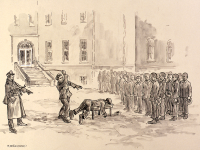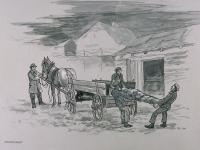    |
Accommodation
1060 Polish prisoners were crammed into 16 classrooms on the first and second floor of the school. As many two-storey and three-storey pallets as possible were squeezed into the rooms.
I did not have any paillasse and had to sleep on the bare planks, I had only a blanket. At the beginning we had to share both the pallet and the blanket.
(E. Majewski, a former prisoner on 02 Sept. 1989)
Food
Compared to the hard physical labour the Sandhofen prisoners had to do in the factory, the food was hardly sufficient.
Usually the prisoners received a daily bread ration of about 100-120 g (30-40 oz) in the evening. Moreover they got in the evening and at noon, in the yard or the works canteen, 750 ml of watery soup from the Kapos, which consisted of turnips, turnip leaves and cabbage leaves. From time to time they were given a richer soup with pearl barley in the evening. On Friday evening at least some milk was partially added which Daimler-Benz had probably donated.
Breakfast was only coffee substitute or herbal tea, which had absolutely no nutritional value.
Because we were so hungry, we tried to get additional helpings of food. For example, after having eaten their soup, my fellow prisoners would wipe their soup bowls clean with their clothes and try to get another helping.
(J. Wojciewski, a former prisoner)
Clothing and Hygiene
The prisoners who had to work at Daimler-Benz had received in September only "summer clothing" (witnessed by M. Marchewka) before they were deported to Sandhofen. The "summer clothing" consisted of a pair of pants, a vest, a striped jacket and trousers as well as clogs and a cap; they had not been given a coat.
However, the heating was at least switched on from time to time during the winter months, so the indoor temperature at the Sandhofen school was bearable. Outside the conditions were harsher: the prisoners had to go on a march to and from work at low temperatures and frequent rain as well as answer roll calls in the school yard and on the factory premises. Many prisoners suffered under these bad conditions and from colds.
Quite a lot of prisoners collected rags, newspapers and cardboard in the Workshops, which they wore under their clothes. Even paper bags with cutout holes for head and arms were worn underneath. Those who were caught by the guards wearing such "underwear" were beaten up or had to "leap-frog" to get warm again.
The prisoners were also plagued by lice, with only one set of clothes and the inability to wash them.
Warm water for washing was extremely rare. We could only wash our hands and shave at the wash-basins next to the toilets.
(K. Zbrzeski, a former prisoner)
Roll Calls and Punishment
The guards tormented the already weakened prisoners with roll calls, which were held every day regardless of bad weather in the schoolyard. After the evening roll call the prisoners who had "shown disobedience" were punished. The reasons for punishment were often rather arbitrary. A prisoner who had joined the "wrong" group during a roll call was punished for the "offence" with 25 blows. A prisoner could also be punished for wearing rags or newspapers underneath his prison clothing or for not wearing his cap
Sickness and Death
Hard work, insufficient nourishment, clothes that were inadequate to the harsh winter climate as well as insufficient hygienic conditions soon caused physical exhaustion and various diseases.
It is almost impossible to reconstruct the number of prisoners who died of the appalling conditions. It is only known that the death of 22 people was reported to the registry office in Sandhofen. In most cases the cause of death was registered as "pneumonia".
It is certain that at least 200 men, who could no longer work because of grave illness or injuries from air raids, were taken to the so-called "Invalids Camp Vaihingen". According to the deportation list 111 of these prisoners died in Vaihingen. Still in March 1945 the majority of the remaining prisoners were transferred to the concentration camp in Neckarelz (Baden-Württemberg).



